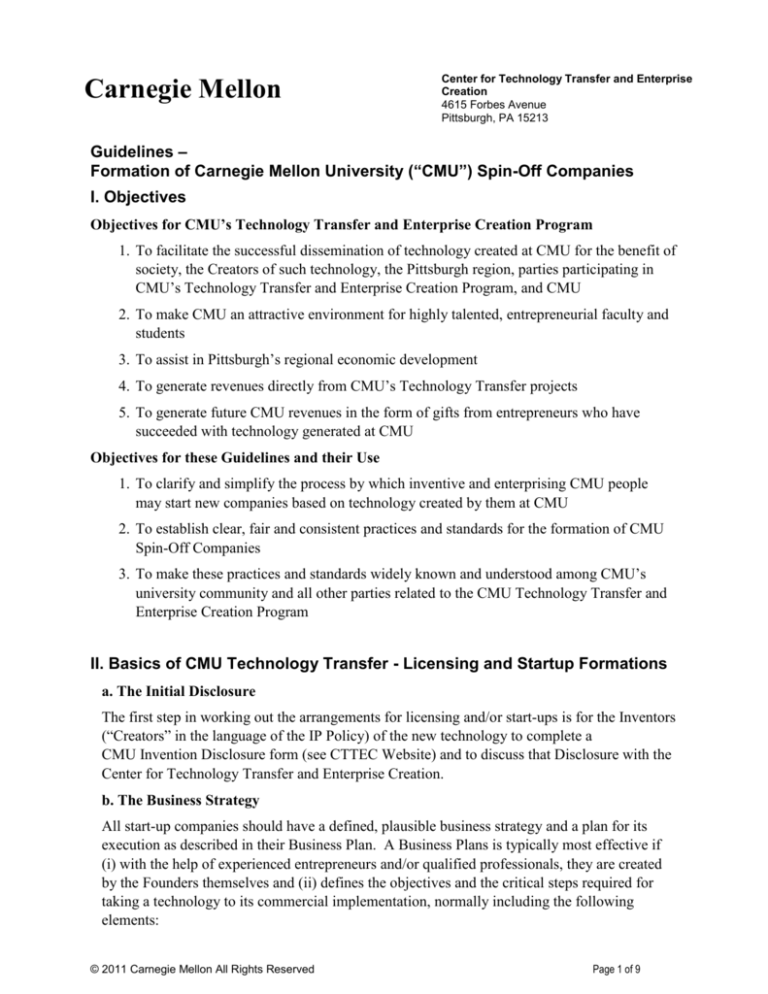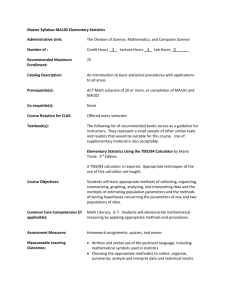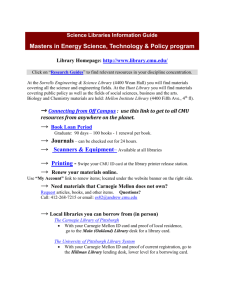
Carnegie Mellon
Center for Technology Transfer and Enterprise
Creation
4615 Forbes Avenue
Pittsburgh, PA 15213
Guidelines –
Formation of Carnegie Mellon University (“CMU”) Spin-Off Companies
I. Objectives
Objectives for CMU’s Technology Transfer and Enterprise Creation Program
1. To facilitate the successful dissemination of technology created at CMU for the benefit of
society, the Creators of such technology, the Pittsburgh region, parties participating in
CMU’s Technology Transfer and Enterprise Creation Program, and CMU
2. To make CMU an attractive environment for highly talented, entrepreneurial faculty and
students
3. To assist in Pittsburgh’s regional economic development
4. To generate revenues directly from CMU’s Technology Transfer projects
5. To generate future CMU revenues in the form of gifts from entrepreneurs who have
succeeded with technology generated at CMU
Objectives for these Guidelines and their Use
1. To clarify and simplify the process by which inventive and enterprising CMU people
may start new companies based on technology created by them at CMU
2. To establish clear, fair and consistent practices and standards for the formation of CMU
Spin-Off Companies
3. To make these practices and standards widely known and understood among CMU’s
university community and all other parties related to the CMU Technology Transfer and
Enterprise Creation Program
II. Basics of CMU Technology Transfer - Licensing and Startup Formations
a. The Initial Disclosure
The first step in working out the arrangements for licensing and/or start-ups is for the Inventors
(“Creators” in the language of the IP Policy) of the new technology to complete a
CMU Invention Disclosure form (see CTTEC Website) and to discuss that Disclosure with the
Center for Technology Transfer and Enterprise Creation.
b. The Business Strategy
All start-up companies should have a defined, plausible business strategy and a plan for its
execution as described in their Business Plan. A Business Plans is typically most effective if
(i) with the help of experienced entrepreneurs and/or qualified professionals, they are created
by the Founders themselves and (ii) defines the objectives and the critical steps required for
taking a technology to its commercial implementation, normally including the following
elements:
© 2011 Carnegie Mellon All Rights Reserved
Page 1 of 9
NewCo’s
technology and its status;
Expected
NewCo products and/or services;
Targeted
market(s), customers, distribution channels; size of targeted market(s);
Competition,
Marketing
Unique
both technical and commercial
and sales strategy of NewCo;
advantages of NewCo, compared to competition;
Economics
of the business, starting with expected gross margins, i.e. the difference between
selling price and product (or service) cost;
Organization
and key people involved, including CEO, key officers, board of directors,
advisory board;
Key
staff and consultants; other key employees;
Operating
Financial
plans, financial assumptions;
forecasts;
Financing
objectives and/or plans, including valuations, financing sources and expected
NewCo ownership and governance;
Current
status of NewCo and expected schedule of actions, events, and accomplishments.
An effective and plausible Business Plan is best be created by the people who will be
responsible for accomplishing the Plan, namely the prospective CEO and the other key leaders
of the business. It should be developed as much for ‘internal’ as for ‘external’ purposes and
should essentially become a ‘set of instructions which NewCo writes for itself’. Assistance by
competent consultants or advisors can often be helpful but should not take the place of the
personal involvement and commitment of the prospective key leaders of NewCo.
The existence of a plausible business strategy is one of the requirements of the Center for
Technology Transfer and Enterprise Creation for engaging in serious Licensing and NewCoformation discussions with Creators and potential Founders.
A substantial number of organizations are available in the Pittsburgh region, at CMU, and
within CTTEC itself which can assist entrepreneurs in the planning and execution of new
company startups; links for such resources are provided on CTTEC’s Website. CMU
encourages new entrepreneurs to make full use of such resources.
c. License Terms
Transfer of CMU technology will always involve a license from CMU to a licensee -- an
existing company or a startup. Such a license might be exclusive – typically for one or more
specific “fields of use” and/or for a specific period for a period of time - if the licensee can
meet certain standards, or non-exclusive with somewhat lower standards.
Examples of CMU license templates, both exclusive and non-exclusive, can be found at
CTTEC’s Website.
© 2011 Carnegie Mellon All Rights Reserved
Page 2 of 9
III. Terms for CMU Spin-Offs
The following two sections cover CMU’s normal terms and conditions for the creation of
CMU Spin-Offs. They are intended to encourage entrepreneurship at CMU and the creation of
new companies and new jobs, particularly in the Pittsburgh region, by providing a “standard
template” with fair and reasonable conditions for Spin-Off creation and for Incubation Services
by CMU.
The terms and conditions described herein are intended to be attractive to CMU CreatorsCompany Founders and competitive with those of other leading research universities and other
alternatives available. Please note that, in the spirit of these Guidelines, these terms will be the
standard that will normally apply; they should not be considered starting points for negotiating
more favorable terms for Creators / Founders.
Section IV describes the “Standard Deal” available to Creator-Founders under normal, average
circumstances; it offers moderate and relatively simple terms but no Incubation Services.
Section V describes “Expanded Deals”, with Incubation Services, that CMU may make
available if desired by CMU Creator-Founders.
IV. The Standard Deal
a. Required Conditions
1. At least one of the Creator-Founders must be a member of CMU covered by the
IP Policy.
2. Creator-Founders who wish to be active participants in the Startup – as consultants,
members of an Advisory Board or Board of Directors, and/or other activities permitted
under CMU policies - may negotiate their own financial arrangements with the Startup
after waiving their normal net proceeds sharing provisions under the IP Policy.
3. If one or more of the Creators do not wish to become Creator-Founders and to negotiate
their own financial arrangements with the Startup, the arrangements defined under
“Special Situations” will apply
4. The Creator-Founder(s) must submit an acceptable Business Plan to CTTEC
5. The circumstances of the proposed Startup and the technology(ies) involved must be
within normal circumstances and within CMU’s normal range of experience. If the
circumstances are exceptional, a Standard Deal will not be available, for example if
unusually large prior investments were made in the technology at or by CMU and/or if
there were unusual research contract terms leading to the Disclosed technology that
would make the “standard terms and standard pricing” of a Standard Deal unfair and
inappropriate. Deals for Startups involving such exceptional circumstances will have to
be developed and negotiated on a case-by-case basis.
b. CMU Equity Ownership
© 2011 Carnegie Mellon All Rights Reserved
Page 3 of 9
CMU’s equity ownership in the Startup at the closing of (i) the First Major Financing
(aggregate investment into the company of $2M) or (ii) of a Change of Control Event (such as
a purchase by another entity), whichever comes first, in a Standard Deal shall amount to -- 5.0% if the License is non-exclusive,
- 6.0% if the License is exclusive.
(Note: The 1% difference represents the premium for exclusivity).
The calculation of such ownership percentages shall include all classes of shares, options,
and warrants outstanding at the time of the calculation.
Such ownership percentages are to be accomplished by issuance to CMU, on the Effective
Date of the License, of (i) shares in the Startup and (ii) a warrant for the acquisition of
additional shares by CMU designed to accomplish CMU’s equity ownership as defined
above.
The securities to be owned by CMU shall have terms, conditions, financial and other
provisions no less favorable than those of the securities to be owned by the CreatorFounders. Similarly, CMU’s rights under the Shareholders’ Agreement shall be no less
favorable than those of the Creator-Founders.
c. CMU Royalties
In recognition of the typical shortage of cash during the initial phases of a Startup, the
License Agreement will provide–
1. that no royalties shall be due or payable to CMU (and/or any of the Creator-Founders)
for a period of three (3) years following the Effective Date of the License or until the
Closing of a Change of Control Event, whichever may occur sooner;
2. after such time, cash royalties to CMU for the remaining term of the License shall be
payable quarterly in the amount of –
- 1.0% of Licensed Revenue if the License is non-exclusive,
- 2.0% of Licensed Revenue if the License is exclusive
Such royalties will not be shared by CMU with Creator-Founders.
If one or more of the Creators do not wish to become Creator-Founders and to negotiate
their own financial arrangements with the Startup, the arrangements defined under
“Special Situations” will apply.
d. Milestones
An exclusive License will involve Milestones that define reasonable progress of the Startup
in order to avoid the possibility of a “dead” or weakly performing License that would block
the licensing of a CMU technology to others if an initial, exclusive Licensee has not been
able to accomplish reasonable commercialization of the technology. If such Milestones are
not met, an exclusive License may, at CMU’s discretion, be made non-exclusive or be
terminated in accordance with the provisions of the License Agreement.
Reasonable Milestones are to be proposed by the Founders of a startup and must cover at
least the following key events and their respective expected completion dates:
© 2011 Carnegie Mellon All Rights Reserved
Page 4 of 9
1. Completion of an acceptable Business Plan
2. Initial management team in place
3. Initial product development and market testing
4. Initial rounds for financing
5. Commercial product introduction (“first commercial sales”)
6. Minimum revenue targets during the first five years
A nonexclusive License will also involve Milestones but less stringent ones that,
nevertheless, will be designed to avoid the possibility of a “dead license”. Non-compliance
with such Milestones will be a cause for terminating the License.
e. Rights with Regard to Future Equity Transactions
As part of any deal under these Guidelines and as is not uncommon for initial shareholders
of Startups, CMU shall also receive the following rights with regard to future equity
transactions, with such rights to be in effect until a Change of Control Event:
1. “Preemptive rights”: The right of current shareholders to maintain their fractional
ownership of a company by buying a proportional number of shares of any future issue of
common stock; such rights are also called “Subscription Privilege” or “Subscription
Right”.
2. “Piggyback Registration Rights” - The rights of an investor to register and sell his/her
unregistered stock in the event that the company conducts an offering.
3. “Co-Sale Rights” - The right of a shareholder to participate in any proposed sale of the
company’s stock to third parties
f. Board of Directors
If and for as long as CMU’s has equity ownership in the Startup or its successor company of
10% or more, CMU will have the automatic right to appoint a member of the Board of
Directors of the Startup. Such Board representation may otherwise also be requested by the
Startup and will in that case also be at CMU’s discretion.
V. Expanded Deal
The Standard Deal will not include any Incubation Services by CMU other than (1) the
completion of normal License and Split agreements and (2) providing Enterprise Creation
services which may be helpful to the Startup. Both of these are normal services provided by
CTTEC, with expenses thereby incurred to be charged to the relevant CTTEC Docket.
If, however, the Creator-Founders wish to use some or all of the Incubation Services which
CMU may be able to make available, they may wish negotiate with CTTEC for an
Expanded Deal that may include one or more of the following Incubation Services, to be
paid for by additional increments of equity ownership to CMU beyond a Standard Deal, as
follows:
b. Access to CMU Space
© 2011 Carnegie Mellon All Rights Reserved
Page 5 of 9
The Creator-Founders may request permission for the use of CMU space, equipment and
certain other physical services (such as computer resources and computer networks) on or
off CMU premises; after review of the Startup’s Business Plan, such services may, at the
discretion of CMU, be made available to the Startup if (i) reasonably available and (ii)
approved by the relevant Department Head(s) or Dean, for a defined period normally not to
exceed two years.
Price –
(1) No charge for minimal use of such services within the limits defined by the IP Policy
(2) For more than minimal use, up to 400 square feet of space including utilities and certain
other services: 1% additional equity for up to 1 year’s services; 2% for up to 2 years.
c. Deferral of Reimbursement of Patenting Expenses
Patenting expenses incurred by CMU/CTTEC for the patenting of the technology(ies)
related to the Startup must normally be reimbursed by the Startup as incurred, payable
quarterly. If requested by the Creator/ Founders, CMU may agree to the deferral of such
patenting expenses (i) for up to 3 years from the Effective Date of the License Agreement or
(ii) until the Closing date of a Change of Control Event or (iii) for international patents, until
the start of expenses for the “national phase” of patenting outside the USA -- whichever
may occur sooner. After such a date the Startup will be responsible for promptly
reimbursing CMU for all additional expenses in the normal manner.
Price – per patent application filed:
- US patenting – 1% additional equity for CMU for each patent;
- International patenting through the PCT phase (but not including the “National” phase) .4% additional equity for CMU for each patent;
VI. Special Situations
a. More than One Technology Licensed to a Startup
The question may arise if the equity percentage (and the royalty rate) for CMU should differ
from the norm (i) if the CMU license to the Startup covers more than one technology or
(ii) if CMU concludes more than one license with a Startup.
Assuming that the combining of more than one technology into one Startup company makes
good business sense, the answer is that the percentages should remain the same.
This is based on the following logic:
Assuming that CMU is entitled to x of any “package”, a larger package should produce
greater dollar returns than a smaller one. For example, 5% of two “single-sized packages”
should produce the same dollar amount as 5% of one” double-size package” – assuming that
the business merits, expenses, etc. of the two alternatives are comparable.
© 2011 Carnegie Mellon All Rights Reserved
Page 6 of 9
The commercialization analysis and business planning for a Spin-Off program involving
more than one technology should, however, concentrate on developing the optimum
business strategy and business economics and the relative business merits of creating one or
more than one Startup company.
For example, if two technologies a related and together can create a more powerful
product and marketing offering, the combining of the two technologies into one Startup
company may have obvious benefits – not only in marketing but also by saving startup
effort, time and expenses, having to carry overhead expenses for only one versus two
operations, having to recruit only one executive team, etc.
On the other hand, if the two technologies are not closely related and/or if each addresses
a different market or type of customer, it may improve the odds of their combined business
success if separate Startups are created for each of these technologies, each with a
dedicated management team with a single mission and with a sales and marketing
program aimed at the specific customers of each technology.
b. Not all Creators are members of CMU or wish to participate in the financial structure
of the Startup
Under any Deal covered by these Guidelines the Creators who wish to participate in a
Standard Deal, i.e. the Creator-Founders, must negotiate their own financial arrangements
with the Startup company after waiving their normal gain sharing provisions under the IP
Policy. There may be cases, however, where some of the Creators may not wish to
negotiate their own financial arrangements with the Startup and instead wish to rely on the
provisions of IP Policy.
Since the IP Policy provides for a 50/50 Split of Net Proceeds between CMU and the Creators,
such a case will require that the Startup assign additional equity percentages to the Creator(s)
who do not wish to participate directly in the Startup (Non-Founder Creators). The amount of
royalties payable by the Startup will also need to be adjusted.
The logic for calculating appropriate financial participation by Non-Founder Creators is
as follows:
1. Since CMU’s equity participation in the Deals under these Guidelines does not include a
Split for Creators, the equity participation of CMU + Creators “under the IP Policy” would
be twice the percentage defined in these Guidelines; for example, for a nonexclusive License
the combined equity participation per IP Policy would be 5% times 2 = 10%.
2. The additional equity percentage to be assigned by the Startup to Non-Founder Creators
will be proportionate to the Split Percentages of the Non-Founder Creators
3. The amount of royalties payable by the Startup will be similarly adjusted.
Example
Assumptions: Standard Deal, nonexclusive license, CMU equity participation = 5%,
royalties (after 3 years or after Change of Control Event.) = 1% of Licensed Revenue
Creator-Founders and their Splits:
© 2011 Carnegie Mellon All Rights Reserved
Page 7 of 9
Creator 1
Creator 2
Total
40.0%
25.0%
65.0%
Non-Founder Creators and their Splits:
Creator 3
Creator 4
Creator 5
Total
20.0%
10.0%
5.0%
35.0%
Equity Participation:
Additional equity participation to be assigned by Startup to the Non-Founder Creators:
5% times 35% = 1.75%
Total equity to be issued by Startup to CMU + Non-Founder Creators: 5% + 1.75% =
6.75%.
Equity Split to be assigned to individual Non-Founder Creators:
Creator 3: 5% times 20% = 1%; etc.
Royalty Participation:
Additional royalties (beyond the Standard 1% of Licensed Revenue) to be payable to
CMU for distribution to Non-Founder Creators: Total: 1% times 35% = .35%;
Creator 3: 1% times 20% = .2% of Licensed Revenue; etc.
Total royalties payable to CMU + Non-Founder Creators = 1% + .35% = 1.35% of
Licensed Revenue
VII. Other Relevant CMU Policies
The encouragement and support of spin-off company formation by CMU does not change
CMU’s other policies which remain fundamental to the university and its governance, such as
the policies on Conflict of Interest, Consulting, and other policies contained in the Faculty
Handbook and elsewhere.
The basic CMU policies on intellectual property are contained in CMU’s Intellectual Property
Policy (IP Policy) which was established in 1985 after several years of deliberations by
CMU’s Faculty and Administration.
Specifically, it must be remembered that CMU employees on full time appointment or on
partial leave (including half-time leave) may not be operating officers of such a commercial
licensee. The positions of an operating officer, particularly in a start-up, is normally
considered to be “all-consuming” and would therefore create a Conflict of Commitment with
the university appointment. Such positions include, without limitation, those of president, vice
president, chief executive officer (CEO), chief operating officer (COO), chief financial officer
(CFO) and chief technical officer (CTO).
© 2011 Carnegie Mellon All Rights Reserved
Page 8 of 9
“Allowed” positions include part-time employment (other than operating officers’ positions) in
such a company which does not interfere with the CMU appointment, consulting within the
provisions of CMU’s Consulting Policy, membership or chairmanship of a Technical Advisory
Board, or membership or chairmanship on a company’s Board of Directors.
CMU employees wishing to start a company therefore face a choice :
(a) An employee who wishes to see the creation of a spin-off company but wishes to remain
primarily committed to his/her CMU appointment should arrange for the employment of a
CEO to take on the task organizing and managing the NewCo.
(b) An employee who wishes to become an officer or assume some other very substantial role
in a NewCo should take a leave of absence from CMU, normally not to exceed two-years.
Upon return to CMU, he/she would need to conduct him/herself in regard to NewCo so as to
avoid any conflict of interest.
Note : Depending on the employee’s personal background, interests and skills, the
employment of an experienced CEO for NewCo may be a good idea even in cases where an
employee decides to become heavily involved with a NewCo.
VIII. Implementation of these Guidelines
These Guidelines provide only the general principles of the provisions and contractual
requirements which will need to be established and negotiated in detail in each specific case.
These Guidelines may be changed in the future. They are not a contract nor an offer to enter
an agreement on these or other terms. Whether CMU will enter any agreement or license will
depend upon the licensee, the technology, and other aspects of the possible arrangements.
Each technology and each transaction must be independently analyzed. The University may
determine that other terms are appropriate for a particular transaction.
If you have questions, please contact your supervisor, department head, and/or the CMU
Center for Technology Transfer and Enterprise Creation.
© 2011 Carnegie Mellon All Rights Reserved
Page 9 of 9




